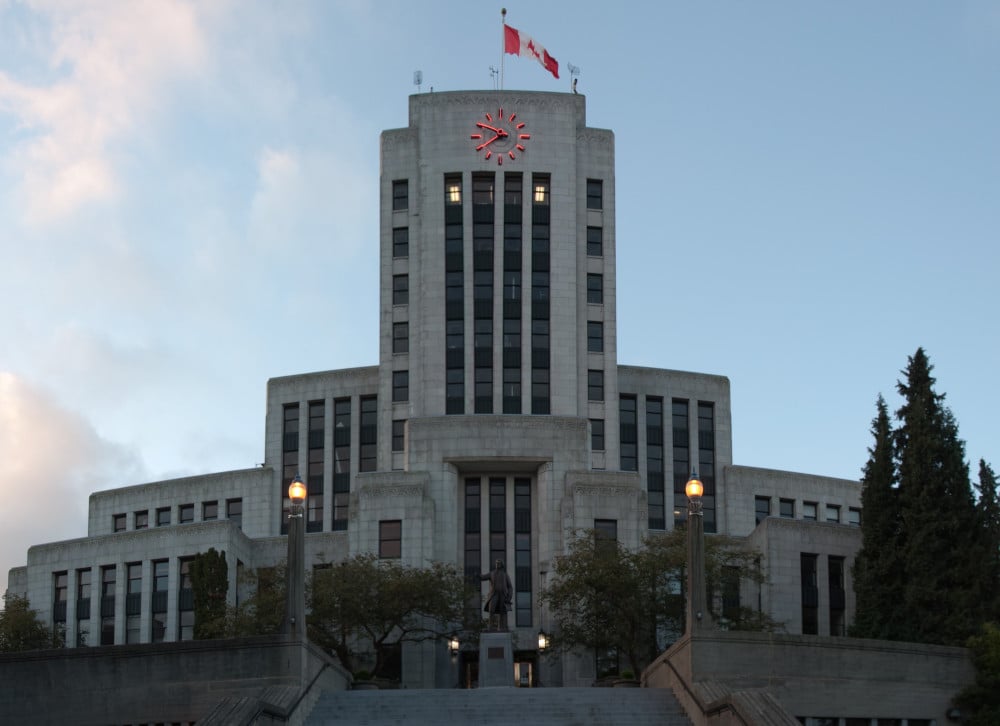Vancouver city council is about to vote on a set of proposed principles for the Broadway corridor. This process intends to set the stage for the Millennium Line SkyTrain extension to Arbutus Street from its current terminus at VCC–Clark Station. Many billions of dollars of new private investment are anticipated along this corridor, with city policy already assuming that most of the city’s job and population growth will occur here.
The question arises: Will this growth be a boon to Vancouver residents or, alternatively, accelerate the affordability crisis by pouring gasoline on our raging land speculation dumpster fire?
Proper planning can make the difference. Here’s how.
The City of Vancouver has already acknowledged that real estate speculation presents a major challenge. Exhibit A: The building of the Canada Line set off a wave of land speculation along the Cambie corridor. The driving up of land prices ensured the per-square-foot costs for housing along the corridor would be high. Yet the city missed its chance to capture that value with proportionally high “land lift” taxes.
By the time the city was ready to rezone the corridor, most of the anticipated land value increases consequent to city upzoning were already “baked in” to land prices, years ahead of rezoning proposals being tabled.
The city has acknowledged this failure by seeking to prevent a recurrence along the Broadway corridor through adopting a Development Contribution Expectations policy. This DCE initiative is meant to quell land speculation by signalling to the development community, far in advance of Broadway corridor re-zonings, that developers should expect to pay an eventual fee equal to $330 per square foot of habitable space, to be paid at time of occupation. Knowing of this eventual development tax should, the thinking goes, prevent developers from paying too much for development parcels and quell the speculative pressures on land price so recently experienced on the Cambie corridor.
This is where this policy should make all Vancouver citizens sit up and take notice. The potential amount of money to be collected could be $12 billion. How it’s spent could go a long way to solving Vancouver’s housing crisis.
In 2013, a report jointly funded by UBC and the City of Vancouver proved influential in making the case for a subway along the Broadway corridor. The study, by the consulting firm KPMG, projected population and jobs both to grow by 100,000 along the corridor. The figure is twice what Metro Vancouver anticipated in its plan, but since so many big decisions have been made based on the KPMG estimate, let’s assume it’s a solid bet.
The DCE policy provides the basis for some math. If Vancouver houses those 100,000 new residents along the Broadway corridor at our current average occupancy of 2.2 persons per unit, that would generate a need for roughly 45,500 housing units. If those units average in size 800 square feet, that adds up to 36.4 million square feet of new residential space. Multiply that number of square feet by the proposed $330-per-square-foot tax and, viola, the city banks, in time, over $12 billion.
What the city plans to do with this money we do not know. The Broadway planning principles include a list of laudable objectives ranging from protecting rental housing to enhancing Broadway as a “great street,” but neither those principles or the DCE documents refer to how the soon to flow billions would be spent beyond a reference to “neighbourhood amenities.”
Finally, we come to the crux of the matter, and why planning policy is so important. Nothing prevents the city from determining at this early stage that the lion’s share of this money should go to solving our most severe crisis: housing.
We don’t have a parks crisis. We don’t have a “great street” crisis. We have a housing crisis.
If even two-thirds of these proceeds were now, at this moment, directed by city council to help fund non-market housing options, we could go very far in solving Vancouver’s housing crisis.
Even $8 billion would be enough to leverage up to 60,000 permanently affordable housing units. These could be tied to land trusts and be protected affordable rental units owned and managed by non-profit housing corporations, or be co-op housing units, or fall within any number of other permanently affordable housing options.
Or we can spend that $12 billion on “amenities” in a part of the city already overflowing with amenities and fix it up so nice that everyone who lives there now would eventually be forced out.
Council has a choice to make as early as this Tuesday when it considers the Broadway planning principles. Will Vancouver be a city that benefits all its residents or one where our sons and daughters continue to flee the city due to exorbitant costs?
Will it continue to be a place where the housing precarious are one paycheque away from living on the streets and homeless numbers seem to swell daily?
Or will we seize the opportunity to reverse these trends once and for all by stating clearly that the one amenity we really need is housing for our people?
It could be the $12-billion question. ![]()
Read more: Housing, Urban Planning + Architecture

















Tyee Commenting Guidelines
Comments that violate guidelines risk being deleted, and violations may result in a temporary or permanent user ban. Maintain the spirit of good conversation to stay in the discussion.
*Please note The Tyee is not a forum for spreading misinformation about COVID-19, denying its existence or minimizing its risk to public health.
Do:
Do not: